Fellows
Each year, the Kaplan Institute's Public Humanities Graduate Practicum supports a cohort of fellows as they develop a public humanities project of their own design. The 2025-2026 fellows and their projects are:
2025-2026 FELLOWS
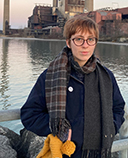 Maggie Allan (English)
Maggie Allan (English)
Chicago Utopias
"The city of Chicago is well-known for its role in the canonical national story of American progress. But Chicago also claims another, perhaps lesser-known legacy: Since the 19th century, the city has also served as a fertile site for thinking and living otherwise. My podcast project, tentatively entitled Chicago Utopias, will explore this fascinating and underexamined dimension of local history. Over the course of our episodes, we will investigate the alternative communities that developed in and around the city of Chicago, examining the historical conditions they sought to oppose, their blueprints and aspirations for a different way of life, and the struggles that arose when idealistic dreamers meet inimical geographic, economic, and social realities. We will also explore the afterlives of these communities, taking a firsthand look through interviews with members of ongoing utopian experiments that have persisted through time. The goal for this project will be to encourage listener engagement with the practical concerns of alternative lifeways and the possibilities for utopian futures in their own communities."
 Calvin Bell III (Philosophy)
Calvin Bell III (Philosophy)
Black Chicago Countercultures
"My project, Black Chicago Countercultures, excavates the histories and amplifies the stories of Black countercultural spaces throughout Chicago, where Black communal aesthetic practices diverge from dominant narratives of anti-Blackness. Two significant questions undergird this project: (1) What does it mean to cultivate a Black counterculture? (2) And how is the Black aesthetic produced within physical space? Thus, I focus on six sites—an art gallery, a jazz club, a dance club, a Black bookstore, a barbershop, and a Black church—each offering a distinct modality of cultural production and solidarity. Methodologically, I will experiment with a participatory research method called photovoice, inviting participants in each space to capture six images that reflect how they experience their environment, followed by recorded conversations about these images. These recorded conversations will form a video series highlighting these spaces as sites of Black study, where the theorization of the practice is always already happening."
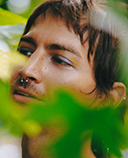 Ali Gali (Performance Studies)
Ali Gali (Performance Studies)
between our gaze: poetic experimentations in organizing for Rogers Park
"My project is a twofold investigation of embodiment and space-making in Rogers Park. To first get to know the neighborhood through those who have been living and organizing in it, I will invite local folks on walks. Approaching walking, talking, sensing as a methodology, I would like to hear from them stories that make sense of their relationship to this neighborhood, its histories and present of organizing, while asking them to show me places, signs, or other physical material that may exemplify the sense of the neighborhood. I have already started to document installations, flyers, and free resources from around the neighborhood. Following these conversations, I will hold three workshops that invite a practice of slowing down towards deep listening. I wonder what we might find collectively as we look again at what is familiar, gather through all our senses, and translate these curious openings for one another. Between these two investigations, I seek to explore how poetic and embodied methodologies may support local, transformative politics."
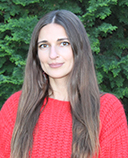 Oana Alexan Katz (Spanish and Portuguese)
Oana Alexan Katz (Spanish and Portuguese)
Heritage Unbound: A Digital Archive for Reimagining Spain’s Heritage (in Spanish: Patrimonio sin límites: Un archivo digital para reimaginar el patrimonio de España)
Heritage Unbound (Patrimonio sin límites) is an interactive digital platform that invites encounters between state-authorized heritage—tangible, intangible, and linguistic—and creative practices that interrogate the material histories of extractivism and exclusion embedded in contemporary Spain’s heritage regime. Across multifarious entanglements, Heritage Unbound amplifies cultural work that reimagines heritage beyond the nationalist and colonial bindings of imperial nostalgia: dancing to animate textile fiber as an inquiry into the genealogies of flamenco culture, summoning ancestors in rituals of co-presence to destabilize the national art museum’s provenance claims, and mobilizing translation in poetry as a material remediation of language beyond linguistic essentialism. Curating constellations of artworks, artifacts, documents, community-based projects, and testimonies, the bilingual Spanish-English site enables users to engage connections across time, geography, medium, and theme. The platform draws on the relational potential of the digital to offer polyperspectival ways of experiencing heritage beyond the infrastructures of patrimonialization, and its raison d’être, conservation.
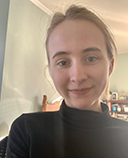 Mila Kaut (History)
Mila Kaut (History)
Chronicling Care: Memory Work as Care Work
"In her poem Poetry is Not a Luxury, Audre Lorde suggested that 'There are no new ideas. There are only new ways of making them felt.' This sentiment rings especially true when it comes to the predominant attitude of indifference toward COVID. My project uses oral history as a tool for effectuating the affective provocations and relationship building necessary to shift how movement workers treat the issue. In partnership with Clean Air Club (CAC), I will spend the coming year compiling community archiving kits and a zine series for inclusion in CAC’s lending library. By equipping library patrons, many of whom are disabled organizers, with the tools to preserve their stories, this project aims to weave once-isolated grief into a shared reality and sense of solidarity."
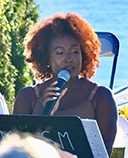 Marsae Lynette (Performance Studies)
Marsae Lynette (Performance Studies)
Performing Preservation: Choreographing Resilience, Restoration, and Cultural Transformation
"I propose to develop and pilot a six-week eco-arts mini-residency hosted in collaboration with Rebuild Foundation’s The Land School and Kenwood Gardens. Working with an intergenerational cohort of 12 to 15 Chicagoland artists, scholars, and students, the residency will advance ecological and cultural preservation through the AARCC method: ACKNOWLEDGE: co-create ground rules and shared language by centering Indigenous epistemologies and intergenerational knowledge; gather local eco-histories of the site; map community assets and needs. ACTIVATE: site-responsive improvisation, embodied workshops, and playful experiments inspired by Richard Schechner’s restored behavior; hands-on sessions in movement, sound, and eco-craft. REFINE: translate workshop material into a collaborative score that integrates spoken word, movement, song, and simple participatory actions for public audiences. CEREMONY: present a public outdoor ceremony rather than a conventional concert, inspired by Sylvia Wynter’s call that the 'ceremony must be found' and Virginie Magnat’s framing of research as ceremony; the event honors ancestors, land, and water while inviting audience participation. CONTINUE: guided by Rinaldo Walcott’s concept of a long emancipation, ensure the work lives on through post-performance dialogues, open-source documentation, a short film, feedback surveys, and a replication toolkit for neighborhood partners."
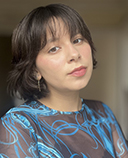 Daisy Donaji Matias (Performance Studies)
Daisy Donaji Matias (Performance Studies)
To Dream is to Know / Soñar es Saber
"For my public humanities project, I will create a video podcast titled To Dream is to Know / Soñar es Saber. This podcast will take as its subject Latin American surrealist and magical realist literature, film, visual art, and other works of cultural production which engage dreams as a major theme and demonstrate ways of knowing which exceed Western epistemologies. Within the scope of the Public Humanities Practicum, I will produce the first three podcast episodes. These will be about Alejandro Jodorowsky’s El Topo; María Sabina’s Vida; and the paintings and literature of Leonora Carrington. I will use these case studies as grounds for exploring the connections between the popularity of magical realism and surrealism within Latin American cultural production and Indigenous epistemologies which remain prominent within Latin American onto-epistemological schemas. You can read more about my scholarly work at www.daisymatias.com."
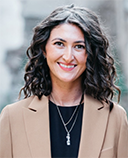 Marcia Maxson (Human Development and Social Policy)
Marcia Maxson (Human Development and Social Policy)
We Built Futures Out of Conditions We Never Chose
"We Built Futures Out of Conditions We Never Chose is a public humanities digital zine project that transforms qualitative interviews into an accessible, community-facing publication that centers the epistemic knowledge of former foster youth in higher education. Using de-identified interview excerpts, collaborative reflection, and narrative design, this zine seeks to illuminate how former foster youth navigate institutions, interpret conditional belonging, and build futures beyond the constraints placed upon them. This project does not treat lived experience as anecdote; it treats it as theory-building in motion. It expands testimony into a digital humanities form that refuses extractive academic norms and challenges who is recognized as a knowledge producer within policy and educational research. The zine will be openly accessible online, making space for meaning-making and scholarship created with former foster youth to circulate beyond the university and institutional gatekeeping. For me, this work is reciprocity and return, an act of relational accountability, narrative reclamation, and a commitment to co-producing scholarship that lives in the world, not only in the academy. It is also a methodological intervention that models a replicable framework for public-facing, ethically grounded dissemination in social policy and education research that honors lived experience as a site of conceptual innovation and collective future-making."
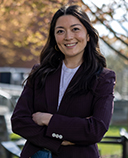 Nalani Saito (Sociology)
Nalani Saito (Sociology)
“Letters to the Continent”
"This project culminates in a booklet of 'letters' written by activists, organizers, academics, and artists to share learnings, strategies, and inspiration for navigating military occupation. Contributors write from current and former U.S.-occupied lands, including but not limited to: Hawai‘i, Turtle Island, the Marshall Islands, Guåhan, Samoa, Puerto Rico, the Philippines, Okinawa, and South Korea. Across the U.S., the Trump administration is deploying federal troops to intervene in and occupy daily life. Having the privilege of researching Hawai‘i, I see many connections between conversations happening in U.S. cities targeted by federal intervention and what people have been saying in Hawai‘i for decades. Contributors share 'letters' written in personal voice and style to their counterparts in the U.S. These letters include advice, reflections, guiding questions, strategies, lessons, and/or resources for facing military occupation. This project will bridge ongoing conversations, moving towards more holistic understandings of, and strategies for, navigating militarism."
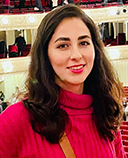 Bita Takrimi (Slavic Languages and Literatures)
Bita Takrimi (Slavic Languages and Literatures)
Bridging Cultures Through Poetry
"Bridging Cultures Through Poetry creates a space for cross-cultural exchange through a series of public translation workshops. Drawing on my background in Comparative literature, I invite participants to collaboratively translate and discuss poems from different traditions. Each session emphasizes accessibility, creativity, and reflection on how meaning shifts across languages and histories."
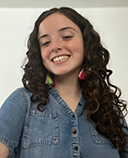 Emilia Tamayo (Screen Cultures)
Emilia Tamayo (Screen Cultures)
Carceral Filmmaking Talk Back
Just Like Us is an interactive documentary co-created with students incarcerated in the Northwestern Prison Education Program, produced under the Pritzker Pucker Studio Lab. The documentary communes between families forcibly separated by the prison industrial complex by sewing together the parallel temporalities of families on the “outside” and their incarcerated loved ones on the “inside” in asynchronous conversation with one another. The Carceral Filmmaking Talk Back is an interactive public humanities initiative to address, refuse, and repair the extractive nature of traditional ethnographic filmmaking. By welcoming documentary participants into engaging roundtable discussions over screenings of the film and its associated exhibition art, the Carceral Filmmaking Talk Back will subvert the extractive creative and theoretical praxes.
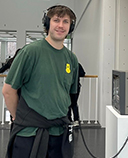 Jacob Waits (Art History)
Jacob Waits (Art History)
Out of Circulation: Conceptual Art and its Publics
"Drawing from materials available within Northwestern’s archival and library collections, this project examines the relationship between conceptual art, paper media, and historical forms of publicly engaged art practice. Frequently leaving behind the traditional gallery space, conceptual artists communicated their work in readily accessible, everyday media channels: in place of canvas, oil paint, marble, or bronze, we find xeroxed pages, self-published books, newspapers, and invitation cards. The theoretical goal of conceptual art was to reappropriate circuits of mass communication, to replace the flow of advertisements and salable commodities with artistic propositions that were meant not to be passively consumed in the gallery, but to circulate directly in the everyday space of the public. My project seeks to return to this initial impetus of conceptual art in order to reframe it as a publicly engaged activity that attempted to recast artistic production as a form of mass-cultural participation through the circulation of text. With this project, I plan to develop a library exhibition and online index to explore how conceptual artists often used cheap, paper- and text-based materials to rearticulate the artwork as, ideally, a discursive site for mass-public engagement."
Previous Fellows
Project descriptions for previous Public Humanities Graduate Practicum fellows are here: graduate/ph-research-workshop/participants/past-participants-pubhum-rw
